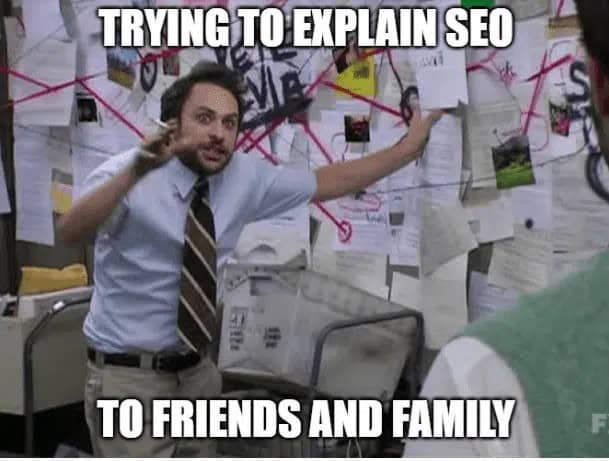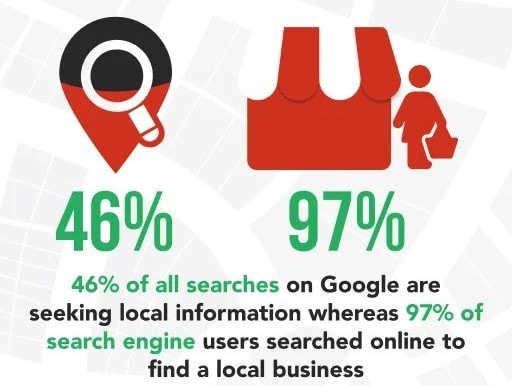What’s the difference between local SEO and organic SEO?
Well, this question is wrong, in my opinion. The answer may be completely different from what you’d expect.
Let’s get into the whole ordeal and go over why you need both local SEO and organic SEO to win!
And who knows? Maybe, by understanding this topic, you dodge a bullet from a sneaky SEO salesman trying to sell you something that you just don’t need.
No such people around here. Not at all. Hah…
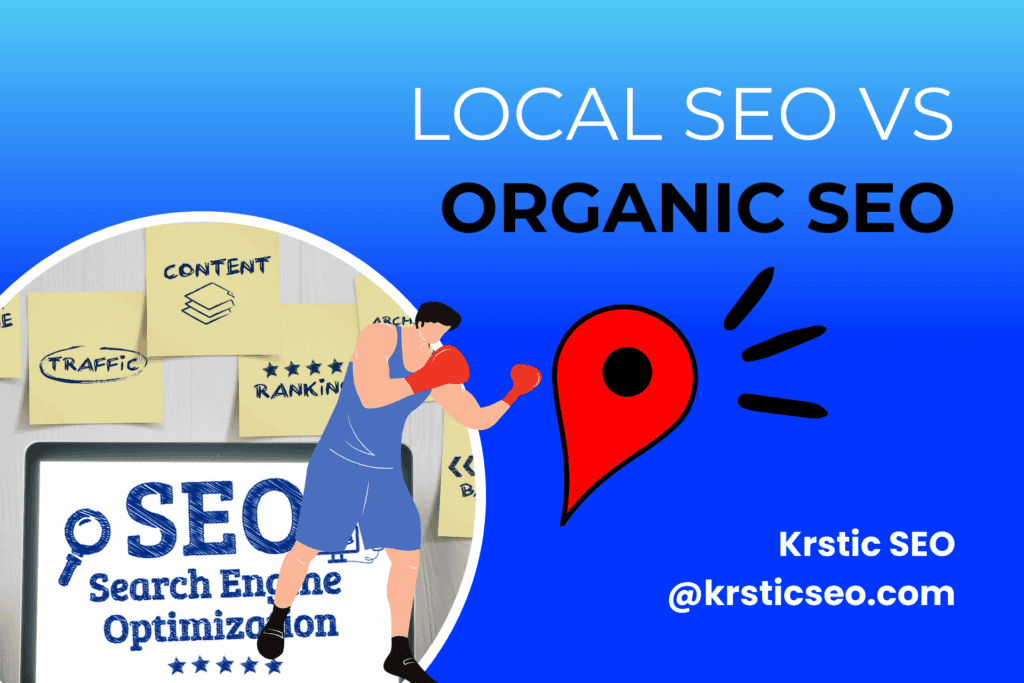
~6 Minute Read
Quick Answer
Organic SEO refers to ranking a website (just like this one) on the top of website results on Google, whereas local SEO usually refers to ranking a Google Business Profile in the "Map Pack" (top three Google Maps results found in local searches, usually over website results). Now, the business that knows what they're doing will incorporate both organic SEO and local SEO to make serious money.
Differences Between Local SEO and Organic SEO
“In the realm of SEO, navigating the crucial discrepancies between local SEO and organic SEO can be an overwhelming and challenging endeavor for every SEO enthusiast.”
LOL! Have you ever run into this stuff before?
Whoever writes like this should be banned from Google. Please make it happen.
Anyway, jokes aside, while our fellow Chat GPT sounds like gibberish, he is right! (or “it,” idk)
Just understanding the word “organic” can be confusing for an every-day business owner like yourself (or an SEO just starting out).
Organic SEO simply refers to ranking a website on a domain you or somebody else owns on top of organic SERPs.
- Organic is a term meant for website results. So, whenever you Google something like, for example, best roofing materials for a home, the page one of Google with the top 10 websites displayed is considered an organic SERP.
- This brings us to the next term, SERPs. This stands for Search Engine Results Pages. One SERP is page one of Google, the only SERP we really care about as SEOs looking for sales.
I don’t know who came up with the term “organic,” but it’s possible that the name originates from the concept of natural placements of different websites on Google determined purely by the quality of the articles displayed.
In a very broad theory, if you have the “best” website in a particular industry, you’ll rank on top of SERPs.
What does best website mean? That’s the story for another day, but let’s now move onto the local SEO.
But first, a meme to break the monotony of the text.
Local SEO refers to ranking a Google Business Profile on top of Google Maps for local searches like:
- Roofer near me
- Plumber near me
- Electrician near me
These would be top local SEO results for a particular keyword:
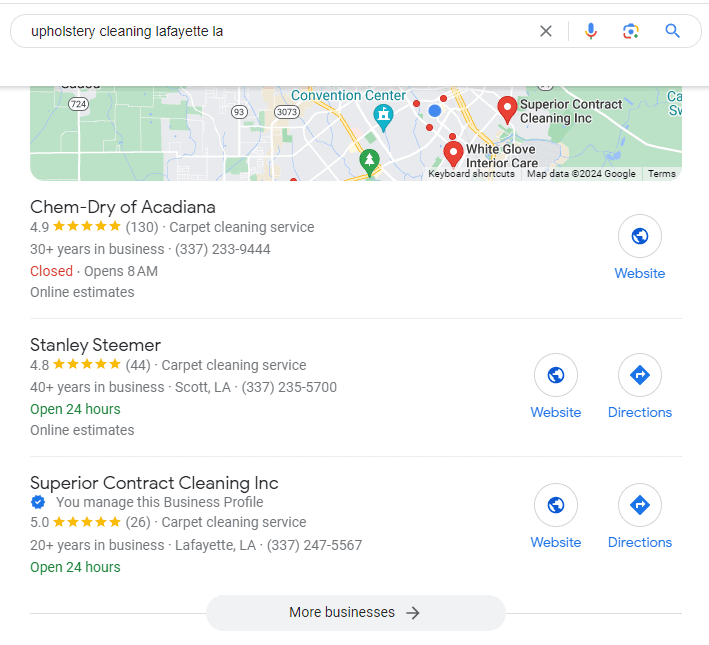
This section of three Google Business Profiles is often referred to as “Map Pack.”
Some may even call it “Snack Pack,” lol.
Now, why would one care about the Map Pack?
Because:
- A half of all searches on Google are local (like the one in the example image).
- Almost everybody uses Google to find a business occasionally, while around three-quarters of people surveyed do it regularly.
- The Map Pack gets 50%-60% of all searchers looking up a local keyword to click on them or call one of those businesses.
Example of Why Local SEO Matters More
The study linked above by First Page Sage goes over how many clicks does each position on Google get from the total number of searches of a particular keyword.
Let’s use “mold removal Miami” as an example.
Very lucrative keyword for restoration companies, which one can tell simply by looking at the demand.
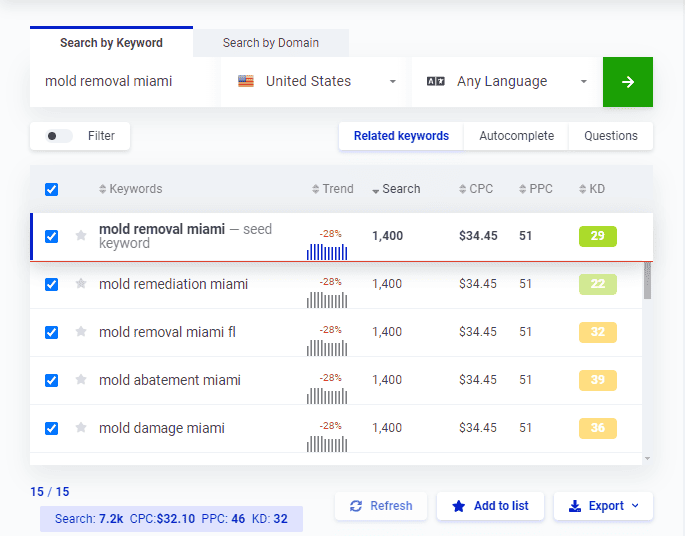
That’s over 7,000 people looking for mold removal in Miami every single month!
Using our data from the study that says that almost 60% of the total demand goes just to the first three companies on Google Maps, you can start to see how powerful local SEO can be.
BrightLocal says that around 5% of all Google Maps viewers will become a lead for a business.
So, let’s crunch some numbers:
- A #1 profile gets 20% of 7,000, which equals 1,400 (NOTE: One profile probably won’t show up in front of all 7,000 people as #1, as proximity of the searcher determines rankings a lot)
- 5% of 1,400 is 70. 70 mold leads for a top ranking Miami company!
- Using the sales numbers, which is typically a 30% close rate (may be higher or lower, I know), one can expect 21 new customers from Google per month.
Average cost of mold removal is around $1,500, which equals to $31,000 in monthly revenue just from local SEO!
So, do you see it now?
All of this without even taking into account organic SEO, which can further help this case.
How Organic SEO Helps Local SEO
Now, I’ll go on and say it.
Local SEO can’t be done without proper organic SEO!
At least not to the fullest extent.
Partially because Google uses a business website to “read” what the business is about, and then they use that info to rank the Google Business Profile that belongs to that business.
One also needs a website to build backlinks. Backlinks, for those unaware, are mentions of your website on other websites with links pointing towards it, mostly business directories, blogs, and media.
A media website can’t link to a Google Business Profile (I mean, they technically can; it’s just weird and unnatural); they need a website for that purpose.
If you read our guide on backlinks, you’ll learn about something called “prominence,” which is used by Google to rank businesses.
In another very broad theory with a lot of caveats, the more mentions you have on other websites, the more prominent your business is, resulting in BOTH higher website rankings and Google Business Profile rankings on the “Map Pack.”
You also need information on your website to sell to your audience.
Google Business Profile, while great for conversions because of reviews, is very limited in terms of information you can display, whereas a website can have hundreds of pages with no issues (as long as they are not spammy).
Local SEO Has a Limit, Organic SEO Doesn't
Another key component of this topic is discussing the limits of local SEO and lack thereof with organic SEO.
Most Google Business Profiles will have a limit in how far they can be found by people looking up, for example, car detailers.

This map shows Google Maps results for the same keyword from different locations.
The green area is close to the business address, going further and further out from there as the color turns red.
The further you’re physically located away from a business address, the lower they’ll rank on search results when you pull out your phone and look up a keyword on Google Maps.
That’s the “proximity” ranking factor explained for you. You can learn more in our guide on how to rank higher on Google Maps.
This limit is never set and stone, but it usually falls between 4 and 10 miles away from a business address in any direction.
Businesses can overcome this by opening new locations in new cities, building up their prominence, and through organic SEO.
Organic SEO has no limit like local SEO, as long as it’s done properly.
Many local businesses can use organic SEO to also monetize in other ways, like selling products, remote services, or even certain types of training/courses.
When doing this, you’re not bound by your local area; you’re instead going nationwide. More on how to rank nationally with SEO.
And while local SEO gets 50%-60% of all local searches, organic SEO has access to an unlimited number of searches as long as it’s done properly.
And, by the way, the top ranking local website on organic SERPs (which, by now, you should know what means) gets over 20% of all clicks anyway.
So, out of 7,000 mold removal seekers in Miami, the top website would also get 1,400 clicks.
This is why companies like Yelp, Angi’s, and Thumbtack keep making millions despite Google pushing it’s own product—Google Maps—in front of everybody else.
Wrapping Up
That’s a wrap up!
Hopefully, you enjoyed this post and learned something new.
As always, if you have any questions, head over to our Contact Us page and hit us up.
If you have an existing website you’d like to be SEO-ed and bring more sales for your company, get our free SEO audit.
Other than that, feel free to learn more from our blog:

Bogdan is a local SEO expert with over 3 years of experience helping businesses grow using Google. When he is not helping businesses grow, he works on his own SEO projects, works out, takes long walks, and watches Suits, which is completely ironic given how rarely he dresses up in a suit himself.

